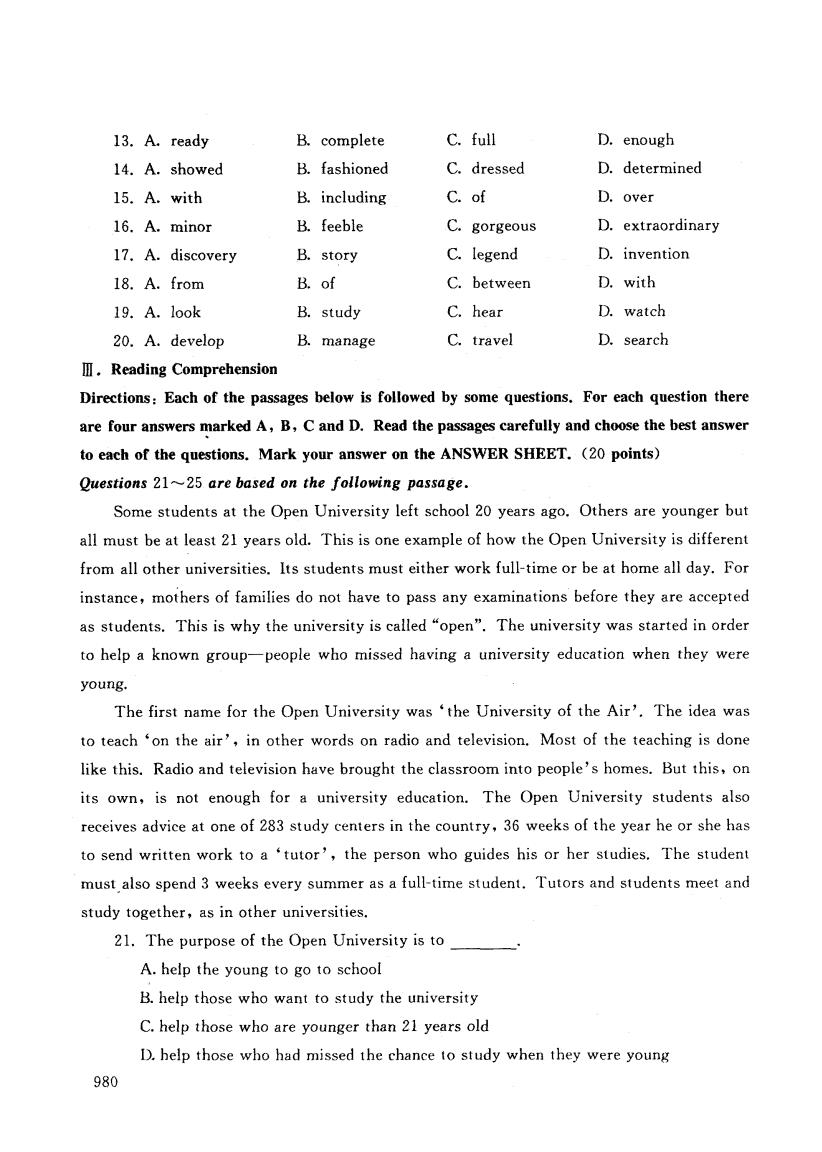正在加载图片...

13.A.ready B.complete C.full D.enough 14.A.showed B.fashioned C.dressed D.determined 15.A.with B.including C.of D.over 16.A.minor B.feeble C.gorgeous D.extraordinary 17.A.discovery B.story C.legend D.invention 18.A.from B.of C.between D.with 19.A.look B.study C.hear D.watch 20.A.develop B.manage C.travel D.search I.Reading Comprehension Directions:Each of the passages below is followed by some questions.For each question there are four answers marked A,B,C and D.Read the passages carefully and choose the best answer to each of the questions.Mark your answer on the ANSWER SHEET.(20 points) Questions 21~-25 are based on the following passage. Some students at the Open University left school 20 years ago.Others are younger but all must be at least 21 years old.This is one example of how the Open University is different from all other universities.Its students must either work full-time or be at home all day.For instance,mothers of families do not have to pass any examinations before they are accepted as students.This is why the university is called "open".The university was started in order to help a known group-people who missed having a university education when they were young. The first name for the Open University was 'the University of the Air'.The idea was to teach'on the air',in other words on radio and television.Most of the teaching is done like this.Radio and television have brought the classroom into people's homes.But this,on its own,is not enough for a university education.The Open University students also receives advice at one of 283 study centers in the country,36 weeks of the year he or she has to send written work to a 'tutor',the person who guides his or her studies.The student must also spend 3 weeks every summer as a full-time student.Tutors and students meet and study together,as in other universities. 21.The purpose of the Open University is to A.help the young to go to school B.help those who want to study the university C.help those who are younger than 21 years old D.help those who had missed the chance to study when they were young 98013.A. ready B. complete C. full D. enough 14. A. showed B. fashioned C. dressed D.determined 15.A. with B. including C. of D. over 16.A. minor B. feeble C.gorgeous D. extraordinary 17.A. discovery ,B. story C. legend D. invention 18. A. from B. of C. between D. with 19.A. look B. study C. hear D. watch 20. A. develop B. manage C. travel D. search M.Reading Comprehension Directions:Each of the passages below is followed by some questions. For each question there are four answers marked A, B, C and D. Read the passages carefully and choose the best answer to each of the questions. Mark your answer on the ANSWER SHEET. (20 points) Questions 21-25 are based on the following passage. Some students at the Open University left school 20 years ago. Others are younger but all must be at least 21 years old. This is one example of how the Open University is different from all other universities. Its students must either work full-time or be at home all day. For instance, mothers of families do not have to pass any examinations before they are accepted as students. This is why the university is called "open". The university was started in order to help a known group-people who missed having a university education when they were young. The first name for the Open University was‘the University of the Air'. The idea was to teach‘on the air',in other words on radio and television. Most of the teaching is done like this. Radio and television have brought the classroom into people’s homes. But this, on its own, is not enough for a university education. The Open University students also receives advice at one of 283 study centers in the country, 36 weeks of the year he or she has to send written work to a‘tutor’,the person who guides his or her studies. The student must,.also spend 3 weeks every summer as a full-time student. Tutors and students meet and study together, as in other universities. 21. The purpose of the Open University is to_ . A. help the young to go to school B. help those who C. help those who want to study the university are younger than 21 years old D. help those who had missed the chance to study when they were young 980